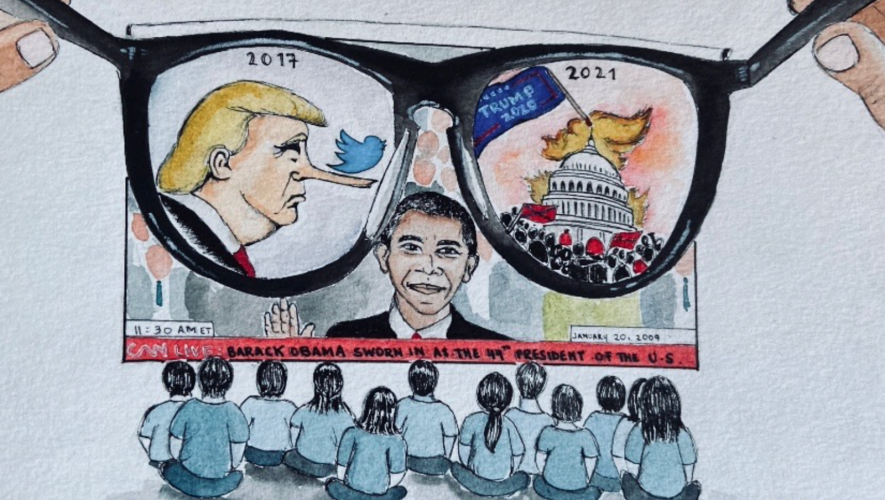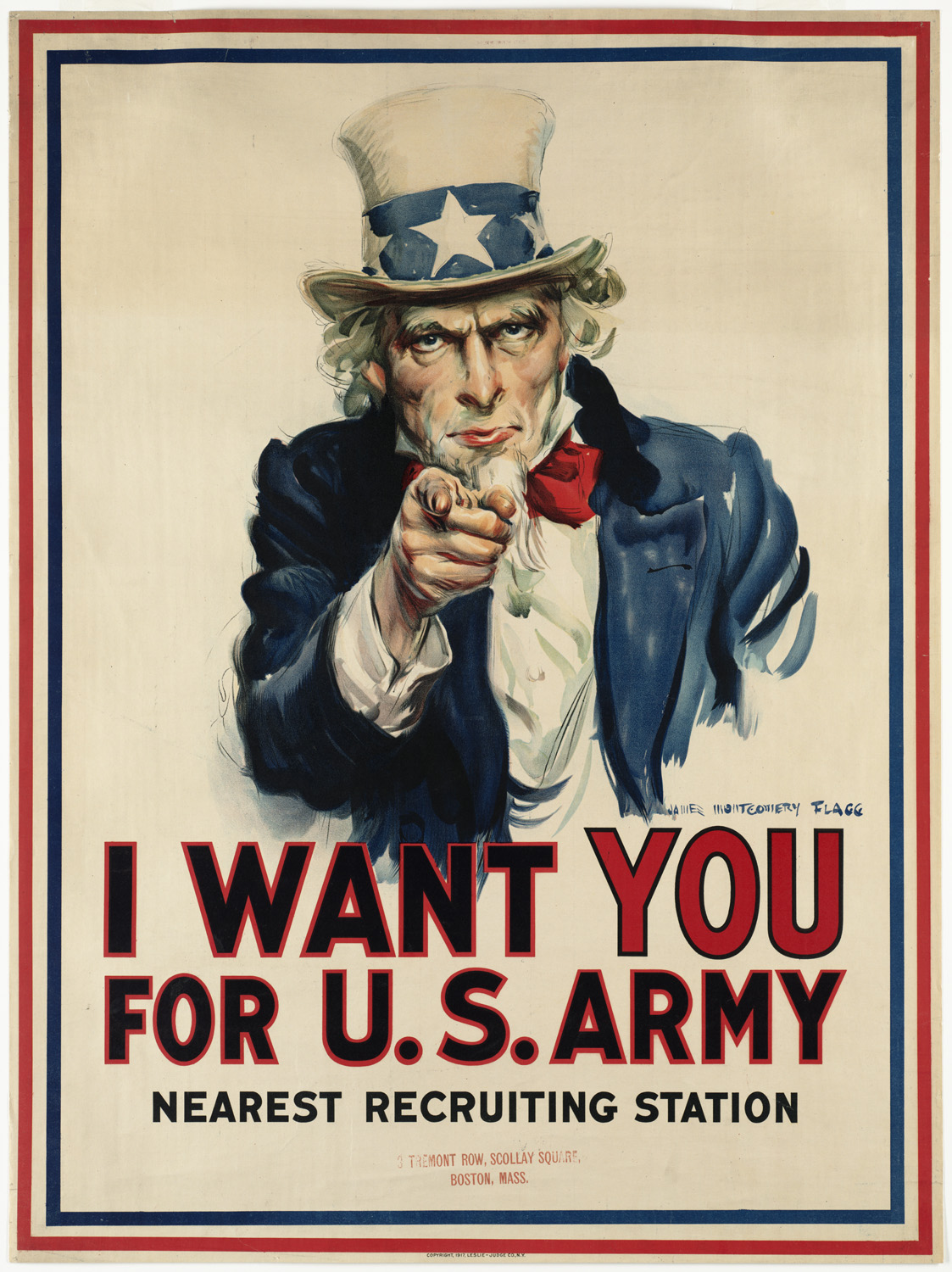Illustration by Ishita Khanna
When Barack Obama was inaugurated for the first time, my fourth-grade class assembled in the school library to watch the ceremony.
I felt a sense of intrigue that day, like an invisible rope was pulling at me. Not because I grasped the significance of Obama being the first Black person taking the presidential oath, not because I understood or loved his policy proposals, and not because of the ceremony’s pomp and grandeur. It was because the way he delivered his address lent a lasting impression that government was a place for serious, intelligent, and dedicated adults to congregate, deliberate, and legislate.
Fast forward to November 2016. I was working the polls in my elementary school’s auditorium, a fifteen-second walk from the library where I’d first felt the pull of politics. As the line of voters dwindled and my duties wound down, I sat at the registry table refreshing the increasingly colored-in electoral map on my phone. Donald Trump’s victory, which so many thought was impossible, became inevitable.
We gradually organized and packaged the ballots. Our Los Angeles district—which hadn’t sent a Republican to Congress in a quarter century and voted 86–10 for Hillary Clinton—was powerless to stop the outcome. When our supervisor dismissed us and everyone else headed home, I trudged toward the library, drawn by an inexplicable urge to recapture the sense of novel, innocent intrigue I’d felt eight years earlier. The door was locked. My sense of intrigue was trapped behind it.
I didn’t watch the inauguration this time. I couldn’t.
It wasn’t because politics no longer intrigued me. Quite the opposite. During the intervening eight years I’d become enthralled by politics, policy, and government. I’d soon declare a journalism and political science major. In almost three years as a NUPR writer and editor—including the last nine months as Editor-in-Chief—my passion for ideas and argument hasn’t dimmed.
I didn’t watch Trump’s inauguration because I feared it would confirm a number of appalling truths.
Nearly everyone who contributes to this publication is an undergraduate, meaning we were between fourteen and eighteen years old when Trump won. Our most important years of learning about politics and policy, government and governance, in classes or in conduct, occurred against the backdrop of President Trump and the following truths.
First, there is no universally recognized baseline of truth to serve as a foundation for public debate. By uttering more than thirty thousand false or misleading statements during his term—more than twenty per day—Trump undermined such a foundation. Political lying did not begin and will not end with him, but the brazenness and persistence of Trump’s lying was a spectacle. By the time you’d finished refuting the lie that Obama founded ISIS, or that millions of people voted illegally, or that God blessed his inaugural speech with sunshine, he’d already moved on to another.
Second, valuing knowledge and expertise is an active choice, not a given. Even as a pandemic killed hundreds of thousands of Americans and tanked the economy, Trump fought qualified government scientists harder than he did the virus. He hyped a drug even when evidence mounted against its effectiveness, claimed case numbers would soon drop to zero, and disregarded intelligence briefings. He ejected career officials and selected the replacements for their sycophancy, not for their experience or knowledge.
Third, accountability is a function of the letter next to a politician’s name. Anyone hoping for appropriate consequences after Trump illegally leveraged his office to score political dirt was sorely disappointed when nearly every Republican congressperson voted against impeachment or removal. Anyone seeking a meaningful Republican rebuke after the president had peaceful protesters tear-gassed to make way for a photo op in front of a church he’d never attended was similarly left wanting. And anyone waiting on a sweeping Republican rebuttal after Trump incited an insurrection is still waiting.
Fourth, democracy, fair elections, and the peaceful transfer of power—which should all be guaranteed rights—have always been earned privileges. Think about all it took to get to Joe Biden’s inauguration. Public outcry shouted down obvious attempts to cripple the post office mere months before an election in which tens of millions of votes were to be cast by mail. Those with functioning brains had to explain why election officials shouldn’t stop counting votes partway through. And we withstood a group of terrorists who briefly seized the seat of government after being egged on by a president who refused to live in reality. All to chase from office a man so egregiously unqualified that he reportedly proposed nuking hurricanes.
I was seventeen when I worked the polls in November 2016. I figured then, and for some time after, that we could collectively unlock the library in 2020. Voting Trump out would be some grand catharsis, a return to normalcy, a repudiation of the serial lying and prejudice that pervaded his presidency, a replacing of toxicity with the sense of intrigue and expectation I’d felt in that room.
It wasn’t. It felt spectacular to fill in my ballot, and it was a relief to see Pennsylvania turn blue to clinch the outcome, but there’s still an awful taste lingering in my mouth. And that’s because of the fifth, final, and most important truth of the Trump era: we are not a different country than we were five years ago.
Trump did not fundamentally alter the nation’s people or their beliefs. He merely fueled and emboldened existing prejudices by campaigning on them, governing by them, and inviting his followers to be the worst versions of themselves. Trump and Trumpism are not an aberration or a fluke; they are the natural progression of a Republican Party that has moved rightward, adopted illiberal tendencies, and undermined truth. Though not universal, many Republican voters either tolerate or approve of these anti-democratic developments.
For those of us studying, writing, and editing political science, it was as if large chunks of our learning were rendered obsolete in real time. We learned how to craft evidence-based arguments just in time to see them devalued. We learned about America’s lofty goals, institutions, and democratic principles just in time to see them assaulted by the person entrusted with enforcing them.
For those who became politically aware at a time when presidents acted like adults, this might seem like a stark deviation. But for those of us who did so during these last four years, Trump didn’t destroy our view of American leaders and what they believe. He sculpted them. The defining figure of our intellectually formative years was not a leader—he was a predator who picked off the weak and vulnerable. This was the example set at the highest level.
The lone silver lining is the toolkit he gave those of us who engaged with reliable, analytical journalism. His atrocities incentivized us to develop a critical eye and examine political events within wider contexts and narratives. His prejudice forced us to reckon with the exclusion and marginalization of our past and present. He taught us to question why the country is the way it is and whether it has to stay that way.
The lesson for us is not that the Biden presidency is destined to be some soothing antidote to bigotry and illiberalism. It’s that Trump, through sheer incompetence, malice, and disregard for truth, has fully exposed America’s systemic challenges. It’s on us to fix them.



